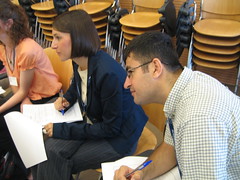 On 25 June Klaas Glenewinkel CEO of the Media in Cooperation and Transition has spoken on the media developments in Iraq and Sudan but because I am more familiar with Iraq I will write on this part of his presentation.
On 25 June Klaas Glenewinkel CEO of the Media in Cooperation and Transition has spoken on the media developments in Iraq and Sudan but because I am more familiar with Iraq I will write on this part of his presentation.
In the conflict zone areas like Iraq things are taking different roles and positions as he has shown one of the video from Alzawra TV (which was banned in Iraq) in the show we have noticed that kind of media have ideological position in Iraq that promotes violence and terrorism against foreign military and people, and there are other media agencies the middle and south of Iraq are promoting sectarianism that’s media is a weapon in the Iraqi conflict actors hand to fight each other.
Also in the Kurdish part of Iraq media had ethnical position and media has seen as one of the main factor in nation building, even after uprising in 1991 when the Kurds had freed from Saddam still the Kurdish leaders did believe that the role of the Kurdish media should be promoting nationalism among the new generation.
And the Kurdish media in the last four decades played the same nationalist role for example during revolution time in (1980s) the role of media was a machine in urging people against dictatorship Saddam’s regime like in 1991 the Kurdish movement radio had main role in urging and organizing people for the uprising.
Another point Klass spoke about it was the difficulty to change the old generation mentality in the area of media in Iraq that according to his organization experience via training Iraqi journalists he found out the old generation not ready to change the form and role of media in Today’s Iraq.
According to my experience from the Kurdish part of Iraq as I have been worked as journalist for 8 years I have seen the same problem that when journalists from the new generation want to change the form and role of media because they have seen the world media especially the western media and got training on the basic standards of professional journalism from International organizations after the Iraq war but they face same challenges by the old generation especially by the old political generation like their colleagues in other parts of Iraq.
But beside all those challenges the new generation of Iraqi journalists could influence some media agencies towards change the role of media from ethnical and sectarian role to support democracy, civil society and transparency.
Another problem that he has raised in his presentation briefly was the lack of independent media in Iraq which basically linked to the lack of the independent economic resources although Iraqi media had freed from dictatorship regime since 2003 but since then most of the Iraqi media agencies funded or controlled by the Iraqi political parties, and the problem about the international fund for free media as he mentioned those media only could survive until were still receiving fund from outside otherwise when the fund did stop the media whether was radio or outlet stopped as well.
And according to my experience in the Kurdish region of Iraq when in 2000 the first Kurdish newspaper launched and 10 years later now we have a few more independent outlets and radios in the region but still they do not have enough money to pay for their contributors except their staff members and because they only can sell a few thousands copies can not make any money from this either, regarding to making advertisements this is also does not work for the free media very much because first companies they do not pay much money for the print media second since most of the companies controlled by the political parties independent press do not expect much from them.
Another issue regarding to the press in Iraq is the language problem for example the Kurdish press is only for the Kurdistan region and the Arab press is for the other parts of Iraq that’s media could not become a bridge between Iraqi ethnics although in Kurdistan region there are some TV programs in Arabic and outlets in Arabic as well but this did not make any different regarding to promote better understanding between Iraqis on their situations in different parts of the country.
Ali Kurdistani, Iraq

